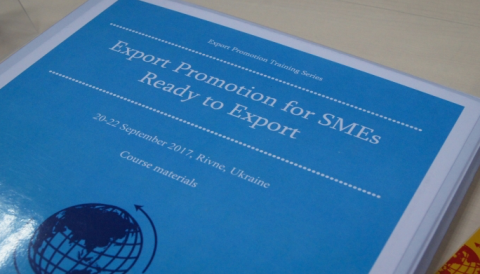
Entrepreneurs representing 14 companies from seven regions of Ukraine recently took part in an EU4Business training on how to start an export business, organised by the Business Support Centre in Rivne.
Ukrainian entrepreneurs are increasingly confident in international markets, but SMEs still have many legitimate and unjustified barriers in their export activities. In order for local business to have a better understanding of export markets and how to develop an export strategy, business support centres have been working in Ukraine under the EU4Business initiative with the support of the European Bank for Reconstruction and Development. The purpose of these centres is to help SMEs reach a new level of performance by providing information on new ways of development.
Taras Komarenko, head of the Business Support Centre in Rivne, says regional business in Ukraine are increasingly looking for access to international markets.
Border regions
"Now every year, we see more and more interest from companies to work on foreign markets, because there are certain factors that strongly influence the company. If we talk about the regions in which we work – Volyn, Rivne and Ternopil regions – we see that those regions that are border regions are psychologically more prepared to export, and have already begun to take some steps. For non-border regions, the possibility of export is less obvious, although the difference may be 70km. Rivne companies are already starting to take an example from Volyn, which is more successful in export and which already achieved certain results over a short time," he said.
One of the features of these export trainings is that the training is conducted by a foreign specialist, who is familiar with the peculiarities of international markets. The Rivne export training was led by Irishman Roddy Fillie, director of the international consulting company Strategy Crowd, who has many years of experience in international sales for startups and SMEs.
Business consultants and experienced exporters emphasise that entrepreneurs have to work hard to find their customers abroad.
One of the obstacles to entering international markets, in particular European markets, is the mandatory certification of products by businesses, which must confirm compliance with the quality standards in accordance with European norms. However, those who have experience in "conquering" European markets, say that getting the appropriate quality confirmation is not so difficult if the product is really good.
Highlight your product
At the same time, trainer Roddie Filly stressed that the presence of a certificate does not guarantee successful promotion in foreign markets, because are products there are certified. Instead, you need to think about the "highlight" of your product or service.
"In the modern world, no one will be surprised by the quality standards, because everyone is trying to comply with them. If you want to be different, then you need to look for other ways - perhaps you can offer faster delivery, or an innovative design," the Irish expert told his audience.
Taras Komarenko of the Rivne Business Support Centre emphasized that a company needed to "polish" all its internal processes to start its export business.
"The most important thing that we see is that in Ukraine, at last, a certain business culture is being cultivated and business processes in companies are being built correctly.”
The Rivne Business Support Centre is part of the EU-funded Network of Business Support Centres, implemented by the EBRD, which aims to improve the competitiveness and bankability of Ukrainian SMEs through the provision of business advice and capacity building. It also supports BSOs in 15 regions of Ukraine in setting up a network of EU4Business Business Support Centres (BSCs). At least 30,000 SMEs and entrepreneurs will benefit from the project.
